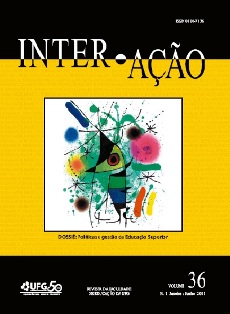THE TEACHING PROFESSION IN ANPED: ANALYSIS OF SCIENTIFIC PRODUCTION
DOI:
https://doi.org/10.5216/ia.v36i1.15028Abstract
The paper examines studies on the teaching profession in higher education produced by the National Association for Post Graduate Studies and Research in Education (ANPEd) between 1996 and 2009. The Work groups examined were the GT 09 and GT 11, as they were considered likely forums for discussion of the theme. Of all the studies produced, only 15 were related to the theme and part of these does not treat of the teaching profession in the capitalist context. There are texts highlighting changes in the labor market and their implications for teaching. Using a critical approach, they analyze the repercussions of this process of exploitation, loss of rights and alienation of workers. One aspect not satisfactorily addressed stands out: the ensuing psychosocial effects, above all, the suffering foisted on teachers in the context of such an unfavorable scenario.Downloads
Downloads
Published
How to Cite
Issue
Section
License
Inter-Ação uses the Creative Commons Attribution 4.0 License for Open Access Journals (Open Archives Initiative - OAI) as the basis for the transfer of rights. Open access means making documents available on the Internet free of charge, so that users can read, download, copy, distribute, print, search, or link to the full text of documents, process them for indexing, use them as input data for software programs, or use them for any other lawful purpose, without financial, legal, or technical barriers.
Authors publishing in this journal agree to the following conditions:
1) Authors retain copyright and grant the journal the right of first publication, with the work simultaneously licensed under the Creative Commons Attribution License, which permits redistribution of the work with attribution and first publication in this journal.
2) Authors are permitted to enter into additional, separate agreements for non-exclusive distribution of the version of the work published in this journal (e.g., for publication in an institutional repository or as a book chapter), with attribution and first publication in this journal.
3) Authors are permitted and encouraged to publish and distribute their work online (e.g. in institutional repositories or on their home page) at any time before or during the editorial process, as this may generate productive changes as well as increase the impact and citation of the published work.















